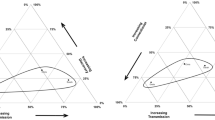Abstract
This article focuses on an experienced high school mathematics teacher who changed her practice without participating in planned interventions aimed at producing this change. It reports on the nature of the teacher’s change from her perspective and an interpretation and understanding of the change from the researcher’s perspective. It illustrates how meaningful change can occur when the process is initiated and rooted in the teacher’s experience based on a tension in self and/or practice that is personal and real to him or her. It discusses three types of change that are possible depending on the level of engagement of the teacher in professional development opportunities: instrumental change, conceptual change, and foundational change.
Similar content being viewed by others
References
Burbules, G., & Biesta, N. (2003). Pragmatism and educational research. Lanham, MD: Rowan & Littlefield Publishers.
Chapman, O. (1999). Inservice teacher development in mathematical problem solving. Journal of Mathematics Teacher Education, 2, 121–142.
Chapman, O. (2001). Understanding high school mathematics teacher growth. In M. van den Heuvel-Panhuizen (Ed.), In Proceedings of the 25th annual meeting of the International Group for the Psychology of Mathematics Education (Vol. 2, pp. 233–240). Utrecht, The Netherlands: Utrecht University.
Chapman, O. (2002). Belief structure and inservice high school mathematics teachers’ growth. In G. Leder, E. Pehkonen, & G. Torner (Eds.), Beliefs: A hidden variable in mathematics education? (pp. 177–194). Dordrecht, The Netherlands: Kluwer Academic Publishers.
Cooney, T. J. (2001). Considering the paradoxes, perils, and purposes of conceptualizing teacher development. In F. Lin & T. J. Cooney (Eds.), Making sense of mathematics teacher education (pp. 9–32). Dordrecht, The Netherlands: Kluwer Academic Publishers.
Dewey, J. (1938/1991). Logic: A theory of inquiry. Carbondale: Southern Illinois University Press.
Even, R., & Ball, D. L. (Eds.). (2008). The Professional education and development of teachers of mathematics: The 15th ICMI study. New York: Springer.
Fennema, E., & Nelson, B. (Eds.). (1997). Mathematics teachers in transition. Mahwah, NJ: Lawrence Erlbaum Associates.
Labov, W. (1982). Speech actions and reactions to personal narratives. In D. Tannen (Ed.), Analyzing discourse: Text and talk (pp. 219–247). Washington, DC: Georgetown University.
Lampert, M., & Ball, D. L. (1998). Teaching, multimedia, and mathematics. Investigations of real practice. New York: Teachers College Press.
Mason, J. (1994). Researching from the inside in mathematics education: Locating an I-you relationship. In J. P. Ponte & J. F. Matos (Eds.), Proceedings of the 18th meeting of the International Group for the Psychology of Mathematics Education (Vol. 1, pp. 176–191). Lisbon: University of Lisbon.
Mason, J. (2002). Researching your own practice: The discipline of noticing. New York: RoutledgeFalmer.
National Council of Teachers of Mathematics. (2000). Principles and standards for school mathematics. Reston, VA: National Council of Teachers of Mathematics.
Schön, D. A. (1983). The reflective practitioner: How professionals think in action. Aldershot Hants: Avebury.
Schwab, J. J. (1967). On scientific inquiry. In C. Madden (Ed.), Talks with scientists (pp. 3–24). Carbondale, IL: Southern Illinois University Press.
Tirosh, D., & Graeber, A. (2003). Challenging and changing mathematics teaching classroom practices. In A. Bishop, M. Clements, C. Kietel, J. Kilpatrick, & F. Leung (Eds.), Second international handbook of mathematics education (pp. 643–688). Dordrecht, The Netherlands: Kluwer Academic Publishers.
Tirosh, D., & Wood, T. (Eds.). (2008). International handbook of mathematics teacher education: Vol. 2: Tools and processes in mathematics teacher education. Rotterdam, The Netherlands: Sense Publishers.
Wells, G. (1999). Dialogic inquiry: Towards a sociocultural practice and theory of education. New York: Cambridge University Press.
Author information
Authors and Affiliations
Corresponding author
Rights and permissions
About this article
Cite this article
Chapman, O., Heater, B. Understanding change through a high school mathematics teacher’s journey to inquiry-based teaching. J Math Teacher Educ 13, 445–458 (2010). https://doi.org/10.1007/s10857-010-9164-6
Published:
Issue Date:
DOI: https://doi.org/10.1007/s10857-010-9164-6




